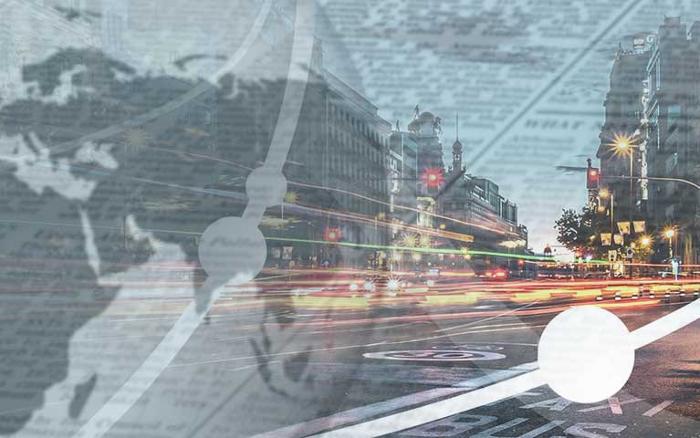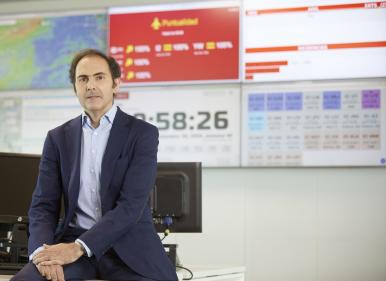

Interview with Javier Sánchez-Prieto, Chairman and CEO of IBERIA
Global Mobility Call should be a point of contact that allows us to realign ourselves with our dual objective this year: post-pandemic recovery and environmental transition in our sector.
1.- What does the Global Mobility Call congress mean for IBERIA and what can we expect from its participation?
We hope that Global Mobility Call serves as the seed for sustainable mobility, which, in turn, should be the axis for the economic and social change that we’re seeing today. And, for Iberia, Global Mobility Call should be a point of contact that allows us to realign ourselves with our dual objective this year: post-pandemic recovery and environmental transition in our sector.
2.- Where is IBERIA’s place in the sustainable mobility ecosystem?
Iberia is Spain’s top airline, the leading carrier between Europe and Latin America, and we’ve also turned Madrid’s airport into our main connection hub. 80% of tourists arriving in Spain in 2019 arrived via aeroplane, so it's absolutely essential that we work on a sustainable mobility model that also ensures the viability of a sector that’s so important for our country and driving economic development.
3.- From your perspective, what steps should be taken to achieve the goal of making Spain a hub for sustainable mobility?
Firstly, I believe that we need to take an in-depth look at the actual mobility needs in our country, which is surrounded by ocean except for the Pyrenees, has two archipelagos and two autonomous cities in Africa.
We also need to have a realistic approach in terms of our potential as a global hub for sustainable mobility, taking advantage of our privileged geographical location and our role as a node for connections between Europe and Latin America.
Lastly, it’s essential to have a road map, the commitment of all actors and the collaboration of the public and private sectors in order to transform and make progress towards a new mobility concept. This concept must be sustainable in the broadest sense of the word, ensuring that we stay connected while also having the smallest possible impact on our environment; sustainable intermodality that enables us to choose the most efficient method of transportation at any given time.
4.- IBERIA has recently entered into R&D agreements with REPSOL and CEPSA to create cleaner fuels. What are some possible outcomes from these joint efforts?
Our agreements with Repsol and Cepsa seek to promote the research, development and production of sustainably sourced fuels in sufficient quantity and at a reasonable price in order to make them a reality for airlines.
We’re convinced that, in the short and medium term, sustainably sourced fuels will be key to increasing the decarbonisation of the sector because they don’t require any technological changes in aeroplanes or supply infrastructures, and they can be easily integrated into our operations.
5.- Electric aeroplanes are already being tested. How far away are we from them becoming the norm in international aviation?
Everything points to the possibility of electrification being a solution within the next decade, but for smaller aircraft and across short distances. But here we have a major contradiction: if we ban domestic flights that operate using small planes, it will be quite difficult for this technology to be adopted.
We're right in the middle of this sector’s transformation; for example, testing has been completed using passenger drones and we’re seeing that the technological advances that once took decades are now occurring much more quickly. The airline industry has faced a lot of global changes and has been working for many years to become more efficient. I'm sure that it will also step up to the plate and take the lead to achieve decarbonisation.
6.- IBERIA also has methods to reduce contamination in other areas besides electrification and fuel. Which methods are the most noteworthy?
As airlines, the largest contribution we can make to protecting the environment is updating our fleets: with our Airbus A350 we’re reducing CO2 emissions by 35% and the A320neo is 50% quieter and also emits 50% less NOx. We're also electrifying the ground equipment that we use at airports to support our aeroplanes.
We're taking strides to make sure that our facilities are as sustainable as possible, and one of the biggest milestones this year was the activation of a larger cogeneration plant on the roof of our engine workshop, which will generate 80 million kilowatts per hour — equivalent to the consumption of 800 homes. This is the first phase of a project that will reach a total of 10 MW of power over the next three years, and a production of 13 million kWh — equivalent to the consumption of 4,000 homes.
Our objective in the short and medium term is to be able to offer our customers a more sustainable travel experience, gradually eliminating plastics on board and implementing a waste management system. We're also harnessing technology to digitalise processes and creating initiatives that allow us to personalise the travel experience and optimise resources at the same time, offering each customer something that truly creates value for them.
7.- Thinking about scientific and technological advances, such as BIG DATA, what are they bringing to this process in the aviation industry, and specifically at IBERIA?
Scientific and technological advances are tools that are turning out to be quite valuable in advancing all of our sustainability initiatives.
Research plays a critical role in the decarbonisation of our sector, and in developing sustainably sourced fuels and new technologies, such as hydrogen-based solutions. Our small contribution in this regard is the Cátedra Iberia (Iberian Chairs programme) which, along with Universidad Politécnica de Madrid, collaborates on research projects that promote more sustainable aviation.
Artificial intelligence and Big Data are also key in developing the improvements that we're implementing throughout the customer experience and, during the pandemic, have enabled us to speed up the verification of travel requirements, for example.
8.- How are investors and customers taking to the actions of the company's sustainability strategy? How is the feedback?
Investors and customers are increasingly demanding that companies have a purpose and that, besides generating profit and creating jobs — our primary duty — we’re also able to make a positive impact where we operate.
I think that, during the pandemic, Iberia has done a great job with repatriation flights, shipping health supplies and the transport of vaccines, and that all of this has also been received positively by our customers.
With regard to our sustainability strategy, without a doubt we still have quite a ways to go. The airline industry is one of the sectors that receives the most criticism, but I hope that we're able to raise awareness about our hard work and that we can communicate that we remain firm in our commitment to decarbonising our activity.
With regard to Iberia specifically, and, as part of the International Airlines Group, we’re the first to commit to reaching zero emissions by 2050 and to operating a minimum of 10% of flights using sustainably sourced fuels by 2030, two truly rigorous objectives that we're working towards achieving.
9.- Air transport is occasionally pointed to as being slower than other sectors in the decarbonisation process. What are some of the obstacles the sector faces?
The reality of the situation is that the airline industry is only responsible for between 2–3% of global emissions, and of that 2%, 80% comes from long-range flights for which there is still no viable alternative to date.
This isn’t to say that airlines are sitting back and kicking up their feet: our sector is constantly making massive investments in our fleet and in new-generation aircraft, which have helped to drastically reduce emissions over the last sixty years. This requires a huge financial effort that we’ve been able to sustain, even during the greatest crisis we’ve seen in our history, but we know it's not enough.
We need the support of the public sector so that the development, production and distribution of sustainably sourced fuels can be done at a reasonable price and in sufficient quantity so that adequate supply to airlines becomes a reality as soon as possible.
We also need the support of the government for a Single European Sky, so that air routes are more direct, at least in Spain and throughout Europe, thereby saving hundreds of kilograms of CO2 for every flight.
10.- What opportunities do the Next Generation EU funds and the “Plan for Spain's recovery, transformation and resilience” offer to the airline industry and IBERIA specifically?
European funds represent a unique opportunity that we have the obligation to make the most of with projects that allow us to overcome the deficiencies revealed by our economy in recent years. They also help us to regain momentum after the COVID-19 epidemic, and transform ourselves and establish the foundations for the economy of the future on a model that’s more sustainable, digital, innovative and socially responsible.
For the airline industry, NEXT GENERATION funds are also a unique opportunity to drive aeronautical activity as an industrial sector, to achieve better social and territorial cohesion and to strengthen Madrid as a hub through multimodality, consolidating our country as Latin America’s doorway to Europe and as a connection node for both Asia and Latin America. They also serve to advance the environmental transition towards a more sustainable model for aviation, improving our air infrastructures and promoting research in hydrogen-based solutions and other technologies that, in the long term, will enable the decarbonisation of the aviation industry.





